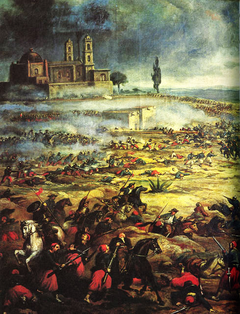
Back سينكو دي مايو Arabic 5 траўня (мэксыканскае сьвята) BE-X-OLD Синко де Майо Bulgarian Cinco de Mayo Catalan Cinco de Mayo Czech Cinco de Mayo Danish Cinco de Mayo German Cinco de Mayo Esperanto Cinco de Mayo Spanish Cinco de Mayo Basque
| Cinco de Mayo | |
|---|---|
 | |
| Observed by | Mexicans, Mexican Americans, and people of non-Mexican heritage |
| Type | Political |
| Significance | Celebration of the Mexican victory over French forces at the Battle of Puebla, on May 5, 1862 |
| Celebrations | Parades, food, music, folkloric dancing, battle reenactments |
| Date | May 5 |
| Next time | May 5, 2025 |
| Frequency | yearly |
| Related to | El Día de la Batalla de Puebla |
Cinco de Mayo (pronounced [ˈsiŋko ðe ˈmaʝo] in Mexico, Spanish for "Fifth of May") is an annual celebration held on May 5 to celebrate Mexico's victory over the Second French Empire at the Battle of Puebla in 1862,[1][2] led by General Ignacio Zaragoza. Zaragoza died months after the battle from an illness, and a larger French force ultimately defeated the Mexican army at the Second Battle of Puebla and occupied Mexico City. However, following the end of the American Civil War in 1865, the United States began lending money and guns to the Mexican Liberals, pushing France and Mexican Conservatives to the edge of defeat. At the opening of the French chambers in January 1866, Napoleon III announced that he would withdraw French troops from Mexico. In reply to a French request for American neutrality, the American secretary of state William H. Seward replied that French withdrawal from Mexico should be unconditional.
More popular in the United States than in Mexico,[3] Cinco de Mayo has become associated with the celebration of Mexican-American culture.[4][5][6] Celebrations began in Columbia, California, where they have been observed annually since 1862.[7] The day gained nationwide popularity beyond those of Mexican-American heritage in the 1980s due to advertising campaigns by beer, wine, and tequila companies; today, Cinco de Mayo generates beer sales on par with the Super Bowl.[8] In Mexico, the commemoration of the battle continues to be mostly ceremonial, such as through military parades or battle reenactments. The city of Puebla marks the event with various festivals and reenactments of the battle.
Cinco de Mayo is sometimes mistaken for Mexican Independence Day—the most important national holiday in Mexico—which is celebrated on September 16, commemorating the Cry of Dolores in 1810, which initiated the Mexican War of Independence from Spain.[1][9] Cinco de Mayo has been referenced and featured in entertainment media, and has become an increasingly global celebration of Mexican culture, cuisine, and heritage.
- ^ a b Lovgren, Stefan (May 5, 2006). "Cinco de Mayo, From Mexican Fiesta to Popular U.S. Holiday". National Geographic News. Archived from the original on September 8, 2006.
- ^ "Recognizing the Significance of Cinco de Mayo". Congress.gov. House of Representatives. May 4, 2009. Retrieved May 1, 2017.
- ^ Greene, Brian (May 4, 2012). "Why is Cinco de Mayo More Popular in America Than in Mexico?". U.S. News & World Report. Retrieved May 6, 2023.
- ^ Krogstad, Jens (May 5, 2003). "University community celebrates Cinco de Mayo". The Minnesota Daily. University of Minnesota. Archived from the original on November 18, 2007. Retrieved April 25, 2016.
Today, the holiday is celebrated more in the United States than in Mexico
- ^ Cite error: The named reference
clnetwas invoked but never defined (see the help page). - ^ "Cinco de Mayo celebrations run all weekend". Deseret News. Archived from the original on September 30, 2007. Retrieved May 8, 2007.
- ^ Hayes-Bautista, David E. (April 2009). "Cinco de Mayo: The Real Story". EGP News. Eastern Group Publications. Archived from the original on June 12, 2016. Retrieved June 2, 2016.
Far up in the gold country town of Columbia (now Columbia State Park) Mexican miners were so overjoyed at the news that they spontaneously fired off rifles shots and fireworks, sang patriotic songs and made impromptu speeches.
- ^ "What Is Cinco de Mayo?". The New York Times. May 5, 2018. Retrieved May 6, 2018.
- ^ Lauren Effron (May 5, 2010). "Cinco de Mayo: NOT Mexico's Independence Day". Discovery Channel. Archived from the original on May 8, 2010. Retrieved May 6, 2023.
© MMXXIII Rich X Search. We shall prevail. All rights reserved. Rich X Search